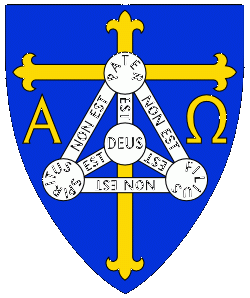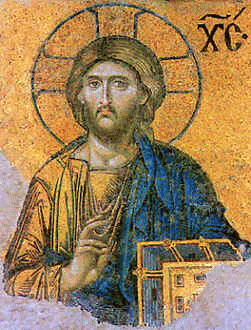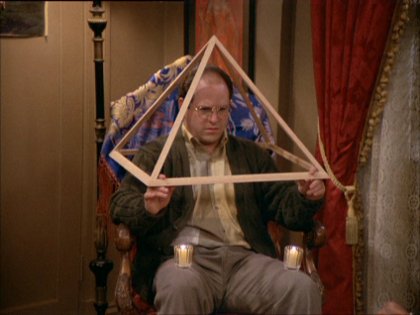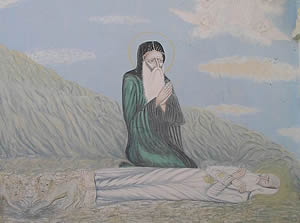Being frustrated with our Brethren
Response to a Friend:
Don’t be discouraged by your fellow Orthodox. Think as highly of them as you can manage. Whenever you have faith, it attracts religion. With religion, you get a spectrum, with the libertines on one end, those who prefer infinite diversity but don’t really care about the Faith at all – they’re just taking up space and purifying it of everyone else, and the jailers on the other end, those who care about absolute homogeneity but don’t really care about people at all – they’re just holding their own and purifying it for everyone else. But neither of those tendencies is really what we mean when we’re talking about Orthodoxy. Sure, they may be Orthodox, but so are a host of people who were merely born into it, and spend the rest of their time selling it out. The Faith is not the collective of what all Orthodox believe; rather, it’s the duty and priviledge of the Orthodox to learn and adhere to the Faith, and to transform it into reality in our lives by deification. There are still those Orthodox who cling to the Faith when it’s opposed by religiosity; I know lots of them. You can hang out with one religious camp for the freedom (but you’ll give up the substance) – you lose the “believe” in “I believe”; you can hang out with the other for the tradition – the Faith itself (but you’ll lose your sense of self – the “I” in “I believe”). Or, you can find the place that admits both kinds of religious people, but doesn’t give them a way to take over. That’s what I’ve done; It’s not perfect, but neither am I.
On the adage your brethren throw at you that something is “merely human”: I like to ask them what they have against humans? Christ became human, and that’s the mystery of our salvation. I’m merely following in his footsteps, He who Alone can enable me to become fully human, and also deified. In fact, it is in Christ’s humanity that ALL creation is deified, for he is the Recapitulation of all categories proper to human beings, and therefore all categories proper to all creation, and therefore the Creation groans and cries out for the Revelation of the human beings – the sons of God – the deified ones. If what I do can only be called human, I will have achieved all I can achieve.
I don’t see them swearing off money and all possessions; they still gas up and go to the store. When they’re wearing the only habit they own, then I’ll consider what they’ve said. The monks are far more reasonable than the people you’re dealing with. That’s because, again, it’s Faith not religion. The monks are the center of our Faith; without them, we can’t understand anything. The ultra-correct jailers are merely being religious, and if you follow them, you can’t understand anything either. The Desert is a friend – to us, not to the Death in us, which it will carve out, and even we lay-ascetics who are not monastics, must cross into the Desert with help, with an appropriate guide, when we can and are permitted. By contrast, the religious offer either a night in Vegas or a night in the penitentiary. It’s neither the Desert nor the Font of Paradise they really offer.
So guard your soul, forgive those who wrong you, consider those who oppose you better than yourself, do not pay attention to your own acts of goodness or you will have already lost them and become a Pharisee, and remember that Orthodoxy is not a belief system; it’s an asceticism. It cannot be defined, only lived. You’ll hear that from people offering it as the justification for libertinism, or as the “correct” doctrine of the jailers, but ultimately you must find it as an experience of continual warfare with the passions and with the world, from which there is no reprieve – no going home and not fighting – and no quick end. Life is war, in this regard. Not war on our ‘wayward’ brethren, and not a matter of setting the infidel straight, but the conquest of self, the last and greatest warfare. And by this, we will overcome the Evil One, and Paradise, which is opened to us, will call out our true names.



 I have found that it is possible for a person to be Orthodox, in the sense that they are baptized, chrismated, do penance, and receive communion, and yet not be Christian. Likewise, it seems possible for an organization to be an Orthodox Church, but not be a Christian community. This will seem controversial, but I think it’s so.
I have found that it is possible for a person to be Orthodox, in the sense that they are baptized, chrismated, do penance, and receive communion, and yet not be Christian. Likewise, it seems possible for an organization to be an Orthodox Church, but not be a Christian community. This will seem controversial, but I think it’s so. In the field of sociology, much really excellent work has been done on analyzing the polity of cult behavior. The analysis has proceeded quite helpfully across confessional boundaries, to think in terms of cult social behavior, cult attitudes (in terms of social psychology), cult social structures, etc. There have been many studies and many lists of earmarks of cults put out, and some points are controversial, while others have nearly universal agreement. “Nearly”, because of course some groups feel justifiably threatened by the analysis. The analysis can apply to an entire group, to a group within a group, to a mere congregation of something vast and universal, or to an entire confession. The sociological elements are key, not anything like “official” status, sanction, or membership. Your tax-exempt status has no relevance. Likewise it does not assume that all cult or cult-like groups will have all of the elements, so analysis is not intended to be comprehensive, but rather to look for a constellation of attitudes and behaviors that elicit a trend. Here are set of common elements culled from some of this analysis: …
In the field of sociology, much really excellent work has been done on analyzing the polity of cult behavior. The analysis has proceeded quite helpfully across confessional boundaries, to think in terms of cult social behavior, cult attitudes (in terms of social psychology), cult social structures, etc. There have been many studies and many lists of earmarks of cults put out, and some points are controversial, while others have nearly universal agreement. “Nearly”, because of course some groups feel justifiably threatened by the analysis. The analysis can apply to an entire group, to a group within a group, to a mere congregation of something vast and universal, or to an entire confession. The sociological elements are key, not anything like “official” status, sanction, or membership. Your tax-exempt status has no relevance. Likewise it does not assume that all cult or cult-like groups will have all of the elements, so analysis is not intended to be comprehensive, but rather to look for a constellation of attitudes and behaviors that elicit a trend. Here are set of common elements culled from some of this analysis: … This is, in fact, the theme of every zombie-genre film from 28-Days to I am Legend: a race of people who are sick and who turn on any one who is not sick.
This is, in fact, the theme of every zombie-genre film from 28-Days to I am Legend: a race of people who are sick and who turn on any one who is not sick.